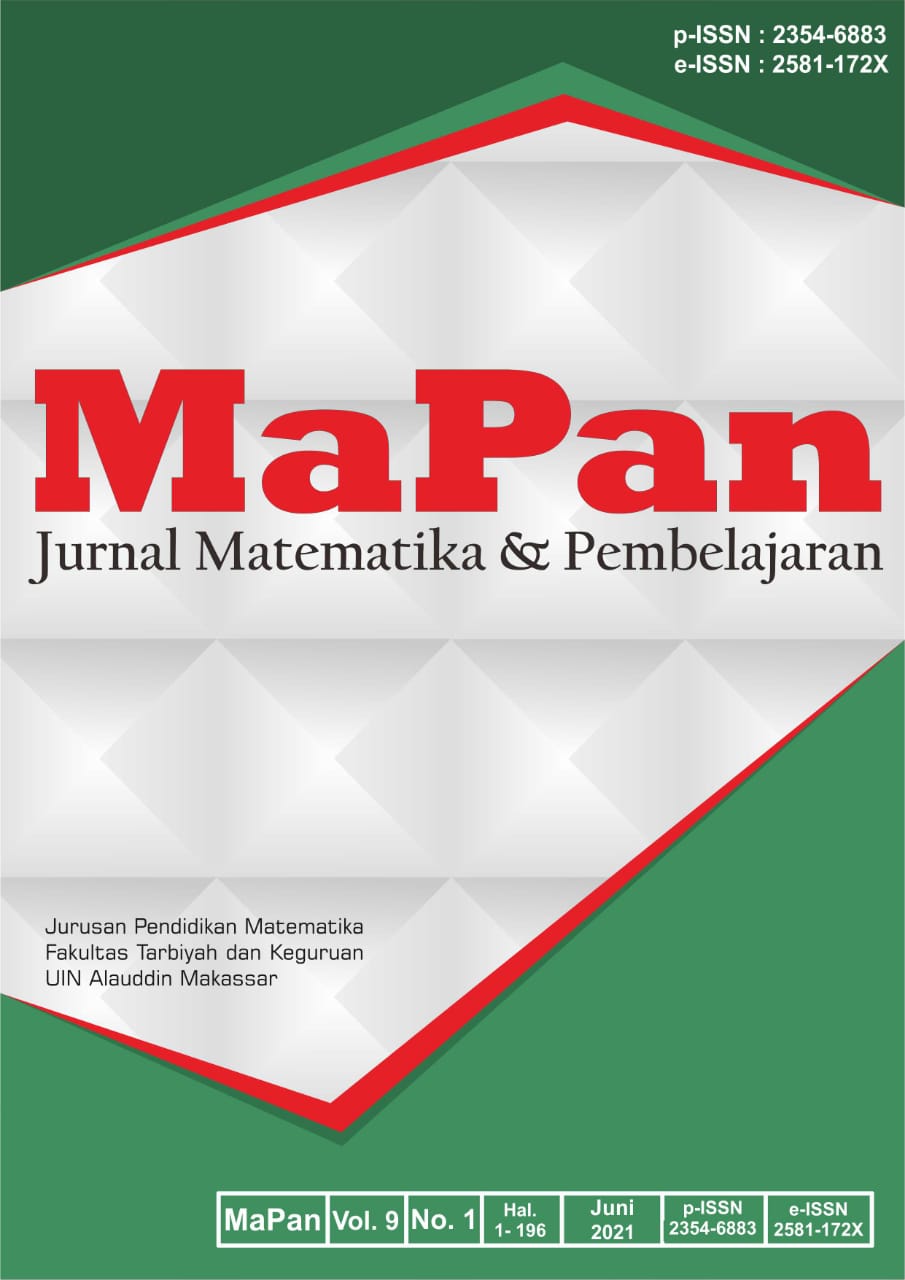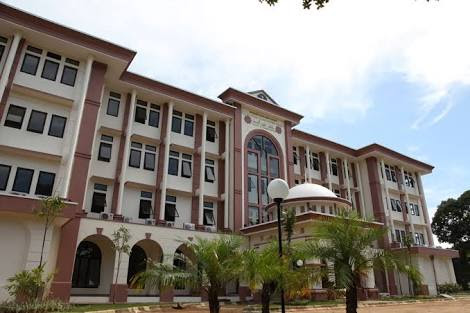FOSTERING STUDENTS' INTEREST IN MATHEMATICS LEARNING WITH THE UTILIZATION OF ETHNOMATHEMATICS THROUGH MAKKUDENDENG TRADITIONAL GAME
Abstract
Interest in learning is one important factor that determines student success in learning. Low student interest in learning is associated with their ability to master the concept of summing whole numbers. This study aims to foster students' interest in learning mathematics through makkudendeng traditional game. The research method is design research starting from the preliminary design, design experiment, and retrospective analysis. The research subjects were students in grade II primary school. The results of this study conclude that the makkudendeng traditional game, which is used as a learning resource in learning the addition of whole numbers, has relevance to the indicators of learning interest, which include: pleasure in learning, interest in learning, attention, and involvement in learning. It is because students learn while playing. So, the makkudendeng traditional game can be a solution to foster students' interest in learning mathematics.
Downloads
References
Abi, A. M. (2016). Integrasi etnomatematika dalam kurikulum matematika sekolah. Jurnal Pendidikan Matematika Indonesia, 1(1), 1–6. https://dx.doi.org/10.26737/jpmi.v1i1.75.
Adhetia, & Suhartini. (2018). Etnomatematika : Menumbuhkan kemampuan berpikir kritis melalui budaya. Indomath: Indomanesian Mathematics Education, 1(1), 35–41. http://dx.doi.org/10.30738/indomath.v1i1.2212.
Adrelia, D. I., Kurniawati, V., & Prahmana, R. C. I. (2015). Permainan bom angka dalam konsep kelipatan persekutuan terkecil untuk anak sekolah dasar. Jurnal Elemen, 1(1), 25. https://doi.org/10.29408/jel.v1i1.77.
Anwas, O. M. (2011). Lingkungan sebagai media pembelajaran dan pengaruhnya terhadap kompetensi penyuluh pertanian. Jurnal Pendidikan dan Kebudayaan, 17(3), 283–290. https://doi.org/10.24832/ jpnk.v17i3.24.
Aras, A. (2016). Comparison of the effectiveness of cooperative learning model between TPS-NHT type and TPS-TGT type in mathematics learning in class VIII at SMPN 1 Makassar. Daya Matematis: Jurnal Inovasi Pendidikan Matematika, 4(3), 313–326. https://doi.org/10.26858/jds.v4i3.2925.
Aras, A. (2020). Model pembelajaran means-ends analysis dalam menumbuhkembangkan kemampuan problem solving dan productive disposition. Al-Khwarizmi: Jurnal Pendidikan Matematika dan Ilmu Pengetahuan Alam, 8(2), 183–198. https://doi.org/10.24256/jpmipa.v8i2.1238.
Arthur, Y. D., Oduro, F. T., & Boadi, R. K. (2014). Statistical analysis of ghanaian students attitude and interest towards learning mathematics. International Journal of Education and Research, 2(6), 661–670. Retrieved from https:// www.ijern.com/journal/June-2014/56.pdf.
Febriyanti, C., Prasetya, R., & Irawan, A. (2018). Etnomatematika pada permainan tradisional engklek dan gasing khas kebudayaan Sunda. Barekeng: Jurnal Ilmu Matematika Dan Terapan, 12(1), 1. https://doi.org/10.30598/vol12iss1pp1-6ar358.
Fitri, N. L. & Prahmana, R. C. I. (2020). Designing learning trajectory of circle using the context of Ferris wheel. Journal of Research and Advances in Mathematics Education, 5(3), 247–261. https://doi.org/10.23917/jramathedu.v5i3.10961.
Fitriyah, A., & Khaerunisa, I. (2018). Pengaruh penggunaan metode drill berbantuan permainan engklek termodifikasi terhadap kemampuan pemecahan masalah siswa kelas VII. Journal of Medives : Journal of Mathematics Education IKIP Veteran Semarang, 2(2), 267. https://doi.org/10.31331/medives.v2i2.653.
Hartoyo, A. (2012). Eksplorasi etnomatematika pada budaya masyarakat dayak perbatasan Indonesia-Malaysia Kabupaten Sanggau Kalbar. Jurnal Penelitian Pendidikan, 13(1), 14–23. Retrieved from http://jurnal.upi.edu/ penelitian-pendidikan/view/1387.
Hendriana, H., Prahmana, R. C. I., & Hidayat, W. (2019). The innovation of learning trajectory on multiplication operations for rural area students in Indonesia. Journal on Mathematics Education, 10(3), 397–408. https://doi.org/10.22342/jme.10.3.9257.397-408.
Maryati, & Prahmana, R. C. I. (2019). Ethnomathematics: Exploration of the muntuk community. International Journal of Scientific and Technology Research, 8(6), 47–49. Retrieved from https://www.ijstr.org/paper-references.php?ref=IJSTR-0519-20295.
Muslimin, Ilma, R., Putri, I., & Aisyah, N. (2020). Learning integers with realistic mathematics education approach based on islamic values. Journal on Mathematics Education, 11(3), 363–384. https://doi.org/10.22342/jme.11.3.11721.363-384.
Pebryawan, K. (2018). Engklek sebagai sarana pembelajaran yang asik di tengah permainan modern. Magistra, 28(1), 62–68. Retrieved from http://journal.unwidha.ac.id/index.php/magistra/article/view/620.
Prahmana, R. C. I. (2015). The hypothetical learning trajectory on addition in mathematics gasing. Southeast Asian Mathematics Education Journal, 5(1), 49–61. https://doi.org/10.46517/seamej.v5i1.32.
Prahmana, R. C. I. (2018). Design research. Jakarta: PT RajaGrafindo Persada.
Prihastari, E. B. (2015). Pemanfaatan etnomatematika melalui permainan engklek sebagai sumber belajar. Mendidik, 1(2), 155–162. https://doi.org/10.30653/003.201512.23.
Risdiyanti, I., & Indra Prahmana, R. C. (2020). The learning trajectory of number pattern learning using barathayudha war stories and uno stacko. Journal on Mathematics Education, 11(1), 157–166. https://doi.org/10.22342/jme.11.1.10225.157-166.
Risdiyanti, I., Prahmana, R. C. I., & Shahrill, M. (2019). The learning trajectory of social arithmetic using an indonesian traditional game. Elementary Education Online, 18(4), 2094–2108. https://doi.org/10.17051/ilkonline.2019.639439.
Sirate, F. S. (2012). Implementasi etnomatematika dalam pembelajaran matematika pada jenjang pendidikan sekolah dasar. Lentera Pendidikan, 15, 41–54. https://doi.org/10.24252/lp.2012v15n1a4.
Supiyati, S., Hanum, F., & Jailani. (2019). Ethnomathematics in sasaknese architecture. Journal on Mathematics Education, 10(1), 47–57. https://doi.org/10.22342/jme.10.1.5383.47-58.
Tandililing. (2013). Pengembangan pembelajaran matematika sekolah dengan pendekatan etnomatematika berbasis budaya lokal sebagai upaya untuk meningkatkan kualitas pembelajaran matematika di sekolah. Prosiding Seminar Nasional Matematika dan Pendidikan Matematika. Yogyakarta: Universitas Negeri Yogyakarta.
Thorndike, R. L. (1994). g. Intelligence, 19(2), 145–155. https://doi.org/10.1016/0160-2896(94)90010-8.
Voinea, M., & Purcaru, M. (2014). Boosting romanian students’ interest in learning mathematics through the constructivist approach. Procedia - Social and Behavioral Sciences, 127, 108–113. https://doi.org/10.1016/j.sbspro.2014.03.222.
Vygotsky, L. S. (1997). The historical meaning of the crisis in psychology: a methodological investigation. R. W. Rieber & J. Wollock (Eds.). New York: Plenum.
Zahrawati, F. (2020). Penerapan model problem based learning untuk meningkatkan hasil belajar sosiologi siswa. Indonesian Journal of Teacher Education, 1(2), 71–79. https://doi.org/10.1016/j.solener.2019.02.027.
Zahrawati, F., & Aras, A. (2020). Pembelajaran berbasis riset dengan memanfaatkan google classroom pada mahasiswa tadris IPS IAIN Parepare. Jurnal Ilmiah Iqra'. 14(2), 143-154. http://dx.doi.org/10.30984/jii.v14i2.1253.
Copyright (c) 2021 Andi Aras, Fawziah Zahrawati

This work is licensed under a Creative Commons Attribution 4.0 International License.


